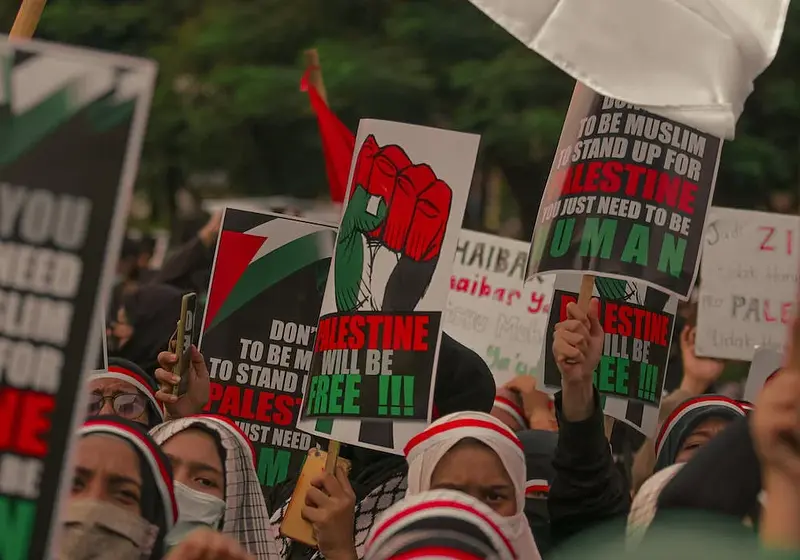In this article, I will explore the history of the Palestine-Israel conflict. To understand this conflict in detail, one must first learn why it started—its roots lie in the early history of this land. I will cover the events from ancient times to the present day.
Disclaimer:
I wrote this article after conducting research over several weeks. The information presented has been gathered from reputable and legal sources, including Wikipedia, The New York Times, The Guardian, The Times of Israel, and the holy book, the Quran. It includes legally verified facts neutrally without bias or prejudice toward any group or perspective.

Image Credit: TIMO From Pexels
Let us slide into your dms 🥰
Get notified of top trending articles like this one every week! (we won't spam you)Early History
The Palestine conflict is not a new issue; it has been ongoing for over 3,000 years, filled with struggles over this land. About 3,300 years ago, Allah commanded Musa to free the Israelites from slavery under the Pharaoh in Egypt. After they were freed, Musa brought them close to Palestine and instructed them to take the city.
However, the Israelites were reluctant to fight, and as a result, they wandered in the desert for 40 years. During this time, Musa received the Torah. The Torah, especially in the Book of Genesis, states that Palestine was given to the descendants of Ibrahim.
This has become a key reason for the Jewish people's claim to the land. Ibrahim had two sons: Isaac, from whom the Israelites come, and Ismael, who is regarded as the ancestor of the Arabs.
Jewish scholars also acknowledge that both Isaac and Ishmael's descendants have claims to the land. After their time in the desert, the Israelites, eventually led by Joshua, took Palestine. However, control over the land changed hands many times, with leaders like King Dawood (David) and King Suleiman (Solomon) restoring Jewish control in Jerusalem.

Image Credit: Haley Black From Pexels

Take the Quiz: Which BLACKPINK member are you?
Find out which BLACKPINK member you resemble the most!
Babylon, Persian And Roman Rule
Centuries later, Babylon, under the rule of Nebuchadnezzar, conquered Jerusalem, destroying the temple built by Suleiman and taking many Jews into exile. After 70 years of Babylonian captivity, Cyrus the Great of Persia allowed the Jews to return and rebuild their temple. The Jewish kingdom lasted for 400 more years until the Roman Empire conquered it.
The Romans severely oppressed the Jewish people, and Jerusalem saw much destruction. However, the Roman Empire destroyed the second temple, leaving only one wall standing, which remains a sacred site for Jews today. Despite their wealth and power, Jews haven’t rebuilt the temple because they believe a Messiah will come, gather all Israelites, including the 10 lost tribes (some of whom have converted to other religions), and rebuild a united Kingdom of Israel, with a new temple as Solomon and the Persian king once did.

Image Credit: Musa Alzanoun From Pexels
Muslim Rule
Centuries later, when Islam emerged, the Muslim caliph Umar peacefully took control of Jerusalem. Unlike previous rulers who had caused bloodshed, Umar emerged in the city without violence, respecting the religious freedom of Christians and Jews. This period saw Muslims, Jews, and Christians living together in relative peace for nearly 350 years.
However, during the Crusades, Christian forces from Europe invaded Jerusalem, massacring both Muslims and Jews. The streets of the city were said to have rum with blood. It was not until Sultan Salahuddin Ayyubi recaptured Jerusalem 90 years later that peace was restored.
Despite expectations of revenge. Salahuddin showed mercy to the Christians and allowed all religions to practice freely once again.
Reconstruction Of Jews
This peaceful coexistence lasted for another 800 years until the Ottoman Empire, which ruled Palestine, fell after World War I. In collaboration with the British, the Zionist movement began to establish a Jewish state in Palestine. Jewish settlers, supported by international backing, began buying land from Palestinians.
The problem resurfaced following the creation of the Zionist movement in the 1890s, which aimed for a Jewish homeland in Palestine. The conflict heightened with the 1917 Balfour Declaration, in which the British government pledged a homeland in Palestine to the Jews. This statement led to years of conflict between Palestinians and Jews. The conflict deepened after World War II, as Jewish immigration to Palestine grew following the Holocaust.

Image Credit: Xach Hill From Pexels
On November 29, 1947, the General Assembly of the United Nations approved the UN Partition Plan, which divided Palestine into three main parts: an Israeli state, a Palestinian state, and the city of Jerusalem as an international city. In 1948, Israel was founded, and hundreds of thousands of Palestinians were displaced. The Nakba (catastrophe) event marks the beginning of the Israeli-Palestinian conflict in a modern sense.
The issue returned after the formation of the Zionist movement in the 1890s, which sought a Jewish homeland in Palestine. Tensions escalated with the 1917 Balfour Declaration, where the British government promised the Jews a homeland in Palestine. This statement triggered years of fighting between Palestinians and Jews. This only intensified after World War II, when Jewish migration to Palestine increased after the Holocaust.
The UN Partition Plan, adopted by the UN General Assembly on November 29, 1947, divided Palestine into three primary territories: an Israeli state, a Palestinian state, and an international city, Jerusalem. Israel was established in 1948, and hundreds of thousands of Palestinians were displaced. The Nakba (catastrophe) event signifies the beginning of the Israeli-Palestinian conflict in a modern context.
The UN plan was opposed by Arab nations, and the day after Israel declared independence, Arab armies launched an attack. However, despite the odds, Israel won the war, further deepening the conflict that persists to this day.
Attack by Hamas
However, on October 7 2023, Hamas, which controls Gaza, launched a surprise attack on Israel. Hamas militants crossed into Israel, killing 1,200 people, taking nearly 24 kilometers of land — a huge area for a country the size of Israel — and bringing 150 Jews back to Gaza as hostages. Source: Wikipedia
Response of the Israeli
After the attack by Hamas, the whole world looked toward Israel to see what its response would be. Israel’s Prime Minister Benjamin Netanyahu announced on TV that Israel would take such revenge on Gaza that no one had ever imagined. Israel immediately cut off all supplies to Gaza—food, electricity, water—and within a few days, it recaptured the area that Hamas had taken.
Israel’s Defense Minister Yoav Gallant gave an interview saying that the fight wasn’t against humans but against animals, and he gave his soldiers the green light to do whatever they wanted, as they were fighting with animals. Israel had the full support of the US, and the silence of Arab countries suggested they were not siding with Palestine, but with Israel.
(You can fully read from their: Israel’s Defense Minister Interview)
Israel then began airstrikes on Gaza, resulting in thousands of deaths. Shortly thereafter, the Israeli army (IDF) entered Gaza. The IDF boasts fighter jets, tanks and troops, making it one of the world’s most formidable armies. Israel is also said to own 80 nuclear bombs and its intelligence service, the Mossad, is reputed to be one of the best in the world - it has 7,000 agents, which makes it one of the biggest spy agencies.
Once in Gaza, the Israeli army advanced into Gaza’s three core cities — Gaza City, Khan Yunis and Rafah. Their initial actions were to sever the links between those cities. To date, more than 50000 Palestinians have died in Israeli airstrikes, and the death toll is climbing fast.
Despite multiple resolutions being presented at UN Security Council meetings regarding Israel's actions, each time, the US has vetoed them. Israel’s supporters, including the US and European countries, have provided full support for its military actions.. Some Arab countries have been less vocal in their support of Palestine.
Muslims Role
While Muslim governments have ignored the issue, Muslim populations worldwide have taken action by staging protests. According to CELEDI reports, out of all protests, only 14 have been in favor of Israel, while 886 have been in support of Palestine. Additionally, Muslims have boycotted Israeli companies and those that support Israel, including Coca-Cola, McDonald’s, KFC, Pepsi, and Nestle.
There are 57 Muslim countries and 2 billion Muslims worldwide. If so many people were to boycott a company, it should theoretically collapse. Initially, these companies did face losses—sales in the Muslim world dropped, and their stock prices fell slightly.
However, within a short period, things began to normalize, and the boycott had no major impact. There could be two reasons for this: either the 2 billion Muslims are so powerless that their boycott doesn’t affect the world, or Muslims didn’t properly carry out the boycott.
Iran Attack
Iran is one of the country that has kept Israel on edge. In response to this tension, Israel attacked an Iranian consulate in Damascus, and Iran retaliated. But why would Israel attack Iran when it is already winning this war so easily?
There are two possible reasons. First, Israel, feeling very strong, may want to draw Iran into the war to weaken it gradually. Second, one of Israel’s three main ports, through which much of its trade with Asia flows, has been severely affected by Yemen, which, with Iran’s support, has reduced traffic at this port by 85%.
As a result, Israel’s ships, which used to reach their destinations quickly, now have to circle Africa to trade with Asia, causing significant economic damage. Additionally, Hezbollah in Lebanon, with Iran’s support, has kept Israel constantly alert. Frustrated by these issues, Israel may have finally decided to attack Iran.
In an interview, Israeli Prime Minister Benjamin Netanyahu was asked who Israel’s biggest threat is. He responded, "The three threats are Iran, Iran, and Iran." While the Muslim world is gradually moving towards recognizing Israel, Iran remains isolated.
I hope you found the information in this article helpful in understanding the roots of this conflict. I am not asking anyone to support one nation over another. We need to stop this conflict to make our world safer and more peaceful—without a resolution, World War III may be looming.





.jpeg)


